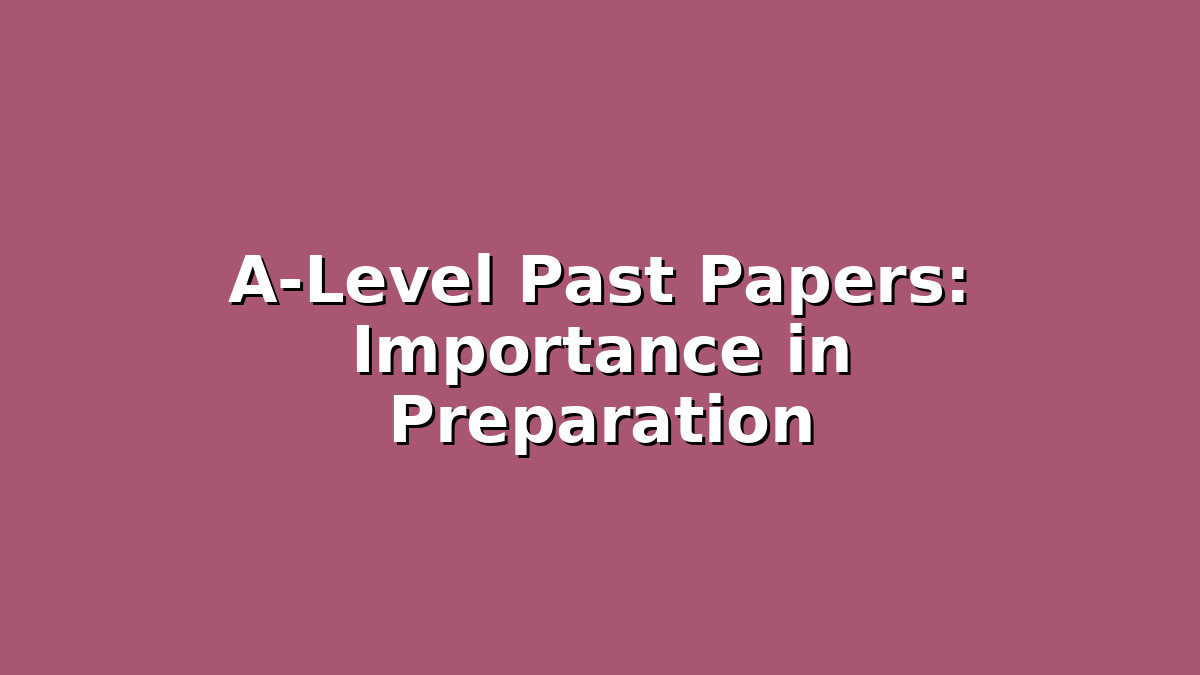Preparing for A-Level exams can be a daunting task, especially with the wide range of topics and the high standards expected. Whether you are just starting your revision or are deep into your study schedule, one of the most effective tools you can use is A-Level past papers. These past papers not only help you familiarize yourself with the exam format but also boost your confidence and improve your exam technique. In this article, we’ll explore why A-Level past papers are essential in your exam preparation and how you can use them effectively to maximize your performance.
Understanding the Exam Format and Question Types
One of the biggest challenges students face when preparing for A-Level exams is understanding the structure of the exam and the types of questions that will be asked. Each exam board has its own style, and subjects vary widely in their requirements. This is where past papers become invaluable.
By working through past papers, you get firsthand experience of the exact format, from the number of questions to the time allocated for each section. This familiarity reduces anxiety because you know what to expect on the exam day. Additionally, past papers expose you to the variety of question types—whether multiple-choice, short answer, essay, or data analysis—allowing you to practice answering them effectively.
For example, if you’re studying A-Level Biology, past papers will show you how often diagrams are required or how questions test your understanding of processes rather than rote memorization. In subjects like Mathematics, you can see the progression of difficulty in problem-solving questions. This insight helps you tailor your study approach to focus on areas you find challenging and understand how to manage your time during the exam.
Improving Exam Technique and Time Management
Knowing the content is critical, but being able to apply that knowledge under exam conditions is equally important. Past papers give you the opportunity to practice exam technique, including time management, which is a skill often overlooked in revision.
When you attempt past papers under timed conditions, you simulate the real exam environment. This helps you develop a sense of how long to spend on each question and how to pace yourself so you can complete the entire paper. With repeated practice, you begin to recognize which questions are worth spending more time on and which ones you should answer quickly to maximize your score.
Moreover, reviewing your answers after completing a past paper is crucial. It allows you to identify common mistakes, gaps in knowledge, or unclear explanations. You can then focus your revision on these weak points, which leads to more efficient study sessions.
For instance, if you consistently miss questions involving complex calculations in Physics, you know to revisit those topics in your textbooks or seek help from teachers or study groups. This targeted practice enhances both your accuracy and confidence.
Building Confidence and Reducing Exam Anxiety
Exam anxiety is a common issue for many students, and it can significantly affect performance if not managed well. One of the best ways to combat anxiety is through familiarity and preparation—both of which are greatly supported by using past papers.
Working through past exam questions regularly makes the unknowns of the exam day much less intimidating. When you have practiced similar questions multiple times, you build a sense of mastery over the material. This familiarity breeds confidence, which in turn helps to reduce stress levels.
Additionally, past papers help you develop a positive mindset by showing you how much progress you’ve made. As you improve in accuracy and speed, you’ll feel more prepared and less overwhelmed. This boost in confidence can be a game-changer, as students who believe in their abilities tend to perform better.
It’s also helpful to combine past paper practice with relaxation techniques such as deep breathing or mindfulness exercises before and during your study sessions. These methods, combined with consistent practice, help create a balanced revision routine that supports both your mental well-being and academic success.
Conclusion
Incorporating A-Level past papers into your exam preparation is one of the smartest strategies you can use. They help you understand the exam format, improve your exam technique and time management, and build the confidence needed to tackle the exam with a calm and focused mind. Remember, the goal of revision isn’t just to memorize content but to become comfortable with applying your knowledge under exam conditions.
Start by gathering past papers for your subjects and create a revision timetable that includes regular timed practice sessions. Review your answers critically, seek feedback when possible, and focus on improving your weak areas. With consistent effort and the right approach, you’ll not only enhance your exam readiness but also boost your chances of achieving the grades you’re aiming for.
Good luck, and remember: every past paper you complete is a step closer to success!

Responses